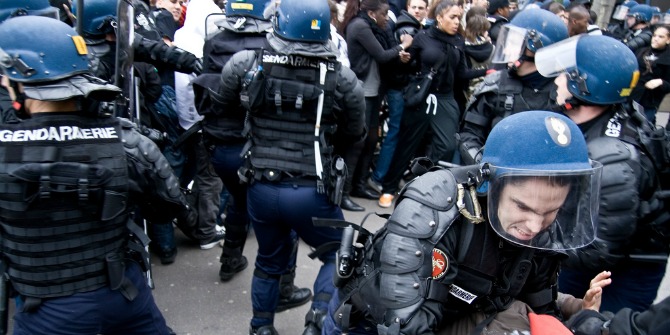
During the time of the 2005 riots, Didier Fassin carried out an ethnographic study in one of the largest precincts in the Paris region, sharing the life of a police station and cruising with the patrols, in particular the dreaded anti–crime squads. This account of contemporary urban policing aims to show that, instead of enforcing the law, the police are engaged in the task of enforcing an unequal social order in the name of public security. Enforcing Order is an intriguing read, not least for what it reveals about the politics of law and order, and of policing, in France in recent times. It also offers interesting insights into French social science and criminology, writes Tim Newburn.
This review was originally published on the LSE Review of Books.
 Enforcing Order: An Ethnography of Urban Policing. Didier Fassin. Polity Press. September 2013.
Enforcing Order: An Ethnography of Urban Policing. Didier Fassin. Polity Press. September 2013.
In 2005, three teenagers from the Parisian neighbourhood of Clichy-sous-Bois, believing that a local police patrol was trying to find them and take them in for questioning, climbed the fencing and took refuge in an electricity sub-station. Like many Parisian teenagers of African origin, they were afraid of the police and were particularly concerned about the consequences of being taken into custody. Their choice of hiding place was disastrous however; all three were electrocuted and two died.
Their deaths occurred at a time when tensions between the police and the residents of Clichy-sous-Bois, and other Parisian banlieus, were already very high. The eventual outcome was some of the most severe rioting in living memory, affecting not just Paris but over 200 towns elsewhere. In excess of 10,000 cars were burned (a particularly French characteristic of rioting), hundreds of buildings severely damaged, well over 3,000 people arrested, and a state of emergency declared by President Chirac.
This is the context for Didier Fassin’s fascinating ethnography of urban policing in one of Paris’ largest police precincts. Fassin is a medical anthropologist and an urban ethnographer whose aim in Enforcing Order is to provide an account of how disadvantaged urban communities experience policing in the periods between civil unrest.
Focusing on one of Paris’ ‘anti-crime squads’ that operate within the deprived world of the banlieu, much of what he then goes on to describe will be familiar to scholars of inner-city policing in the US, the UK and elsewhere. There is aggressive use of ‘search’ (or ‘frisk’) tactics as a means of displaying power and keeping control and which – just as in London and New York – symbolize better than anything else the tensions between marginalized youth and the state. There is the disconnect between the cops’ desire for excitement and the generally routine nature of much of the job. And there is the increasingly dominant rhetoric of ‘war’ used by politicians to justify the heavy-handedness of state intervention in the poorest communities. The irony, as Fassin’s eighteen months with the anti-crime squad suggest, is that in reality there was simply not enough going on in the banlieus to keep the cops busy.
Where Fassin’s account becomes more unusual (from a British point of view at least) is when his account moves on to consider how the residents of the banlieus are subject to racial categorization by officers – sometimes in a subtle manner, but oftentimes not so – and the racist language that went hand-in-hand, he argues, with discriminatory practices. It is not that such profiling and unequal treatment isn’t to be found in England – far from it – rather that there is a sensitivity around race and ethnicity, certainly as far as the use of language is concerned, which had certainly not permeated French policing by the time of Fassin’s research. Or, at least, officers seemed less concerned to hide it. In addition to an underlying racism, the culture of the anti-crime squad emphasized their toughness and potential for violence, as well as playing on the considerable autonomy they enjoyed with a consequent freedom to bend the rules. It was perhaps of little surprise therefore that Vic Mackey – the corrupt cop at the heart of the US TV series The Shield – was something of an idol to many in the squad (though this may have changed since given that hard-nosed French policing has itself subsequently been immortalized in Braquo, and to a lesser extent in Engrenages/Spiral).

Fundamentally, what has occurred in France in recent times, Fassin argues, is that the police have become increasingly concerned to ‘enforce order’ rather than ‘maintain the peace’ – they are forces de l’ordre more than gardiens de la paix. Although France is hardly alone in its drift toward an increased emphasis on enforcement, Fassin argues that two features of French policing make such a shift easier than might otherwise be the case. First, despite the rise of municipal policing and private security, the majority of socially sensitive policing, such as the policing of the banlieus, is undertaken by the national police – a force accountable to the state rather than the people. Second, and linked to this, policing has increasingly come to be a favoured tool for the management of social problems, including the problems characteristic of the precarious communities of the type found in this book. The outcome has been increasingly marginalized neighbourhoods policed by ever-tougher and rougher cops. The driving force, crudely, has been the nature of French politics in the past decade or two, and if a single culprit is being sought, then it is clearly Nicolas Sarkozy’s fingerprints that Fassin suggests we will find on the smoking gun.
Enforcing Order is an intriguing read, not least for what it reveals about the politics of law and order, and of policing, in France in recent times. It also offers interesting insights into French social science and criminology. For those of us on the other side of the channel used to the relative ease of access to the police service, Fassin’s account of the barriers that the French state has put in the way of research will come as something of a shock. The shift – essentially giving the Ministry of the Interior something close to a monopoly over policing research – took place when Fassin was a little over half way through his fieldwork and it was only through a combination of persistence, and no little good fortune, that he was able to come anywhere close to completing his work.
If the barriers that now exist in France are not so evident elsewhere it is nevertheless the case that full-scale ethnographies of policing are something of an endangered species. Fassin’s work is all the more important therefore and it is to be hoped that it acts as something of a stimulus to other researchers in this field. If they do follow in his footsteps, however, it would be nice to see them paying slightly more attention to the rich history of police ethnography than is evident in Enforcing Order.
Nevertheless, this is a rich text that has as much to say about the current state of the French polity as it does French policing. If I have one disappointment it was Fassin’s failure to deliver on his promise to provide a ‘tentative application of the art of story telling to the monotony of routine’. Some of the very earliest ethnographers of policing in the 1960s quickly spotted the fact that the day-to-day reality of an officer’s life falls some way short of the continuous excitement and thrill that newcomers imagine it may contain and dramatic representations try to suggest lies at its heart. My high hopes that Fassin would finally do justice to the crucial, though admittedly hard-to-capture, monotony and tedium of much of the job were not fully realized, and we will have to wait for another skilled ethnographer to take on this challenge.
————————————-
Tim Newburn is Professor of Criminology and Social Policy and Head of the Social Policy Department, London School of Economics. He is the author or editor of over 30 books, including: Handbook of Policing (Willan, 2008); Policy Transfer and Criminal Justice (with Jones, Open University Press, 2007); and, Criminology (Willan, 2008). He is currently writing an official history of post-war criminal justice, and was the LSE’s lead on its joint project with Guardian: Reading the Riots. He tweets at @TimNewburn. Read more reviews by Tim.








2 Comments